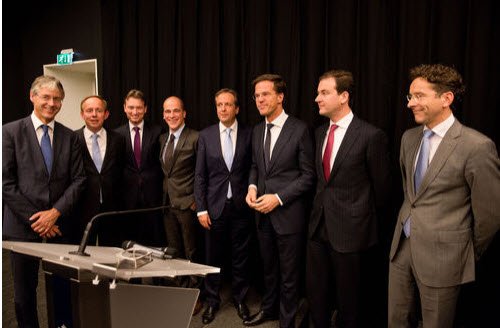Dutch News reports that on Friday evening, the three opposition parties have agreed to support the cabinet’s austerity drive, giving the coalition an essential but narrow majority of just one in the upper house of parliament.
The D66 Liberal democrats and minor Christian parties ChristenUnie and SGP finalised their deal with ministers on Friday night. They have agreed to throw their weight behind the government in return for policy concessions.
These include significant shifts in cabinet plans. For example, the decision to phase out the basic income tax break for high earners will go, there is €600m extra for education, cuts in child benefit will be scrapped and the value-added tax reduction on home and garden maintenance will be extended throughout 2014.

(Photo Novum)
Funding
To fund these changes the cabinet has agreed to extra cuts in some ministerial budgets, higher taxes on mains water and cars and a €500m subsidy cut for industry.
They have also agreed to bring forward cuts in unemployment benefit by six months to July 2015 and to speed up some other measures agreed between unions, employers and ministers earlier this year.
On balance, household spending power will not go down next year by as much as had been forecast, Nos television said. Some households will be better off.
The new partnership will run for one year but the five parties have also agreed to look together at the cabinet’s pension reforms, which have run into trouble in the senate.
Broad support
‘We have made some concessions,’ said Labour leader Diederik Samsom. ‘But this broad support shows the Netherlands that we can move on.’
‘The most important thing is that we can remove the uncertainty and create political calm,’ said Halbe Zijlstra, leader of the VVD in the lower house of parliament.
D66 leader Alexander Pechtold said his party remains in the opposition but that he is willing to help the cabinet where possible. This agreement is based on three D66 fundamentals, he said: lower taxes, more money for education and more jobs by speeding up labour market reforms.
What other papers say
The late-night agreement between the cabinet and three opposition parties has given prime minister Mark Rutte some breathing space, but nothing is yet certain, say the Dutch papers on Saturday.
The Volkskrant points out in its analysis that the social agreement – the deal on job creation signed earlier this year by unions, employers and ministers – is being broken open after all.
Prime minister Mark Rutte has been brushing away all the cynics who said his second government may also strand and that he needed a rescue plan, the paper writes.
‘Late on Friday night we had the official recognition [of this] in the form of the budget agreement,’ the paper said. The three opposition parties have assumed the status of rescue workers who are giving Rutte artificial respiration in the hope of breathing new life into his cabinet.’
‘We still don’t have a determined cabinet but at least the political fundamentals are there,’ the paper said.
Nick of time
The Financieele Dagblad says the government has once again agreed a budget ‘in the nick of time’. The prime minister was deaf to opposition calls before the summer holiday on how he planned to put together a €6bn austerity package.
What has happened now is unique in Dutch political history, the paper says. We have now had a sort of interim government formation process to which everyone was invited.
The resulting coalition is ‘purple’ with a Biblical tint, the paper says. ‘Purple’ was the name given to two VVD, D66 and Labour cabinets last century.
The two Christian parties ChristenUnie and the SGP were keen to soften the impact of the austerity package on families with children, while D66 wanted more money for education and redundancy reform.
High price
The Parool says the cabinet has paid a high price for the agreement. It points out that the fundamentalist SGP won just 2% of the vote at the last election but has been able to influence the budget to the tune of €1.2bn, through ensuring school books remain free, child benefit is not cut and the defence ministry gets more cash.
But even if it appears there is now stability in The Hague, it is still far from certain, the paper says.
‘Every agreement the government has signed has loose ends. Look at the panic after the new government was formed last year and the income-dependent health insurance plan was quickly dumped. It remains to be seen if the cabinet has been careful this time round.’
‘The big question mark remains over how the government will cope with any further setbacks,’ the paper states.
Continual formation
Writing in Elsevier’s online version Syp Wynia says the prime minister is not running the country. ‘He has been conceding, informing and repairing for a year or three,’ Wynia states.
‘Rutte has too many late night meetings with civil servants and and politicians in an effort to keep his administration afloat. He is not running the country, he is permanently putting a coalition together.’
‘Belgium came under fire when it took 541 days to put together a new coalition government,’ Wynia says. ‘But the Netherlands has beaten that record hands down.’
 Archive of posts from Saba-News.com Archive Saba News
Archive of posts from Saba-News.com Archive Saba News